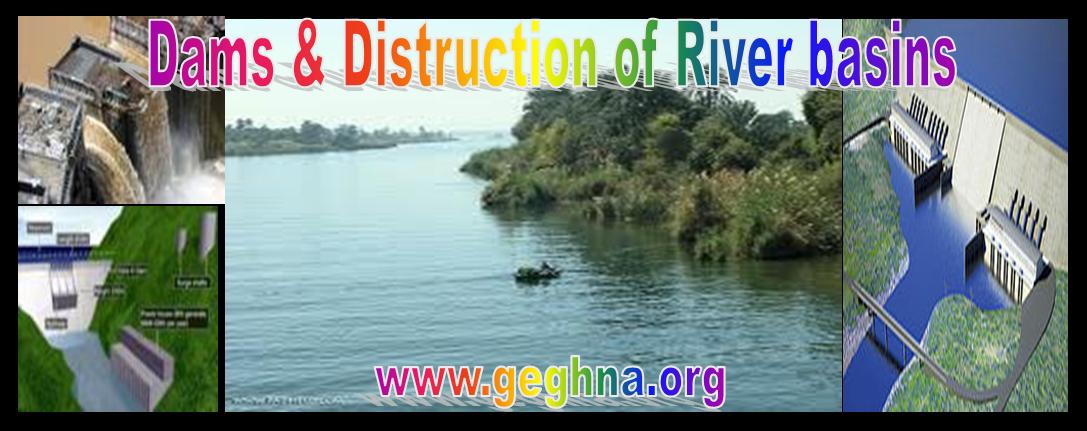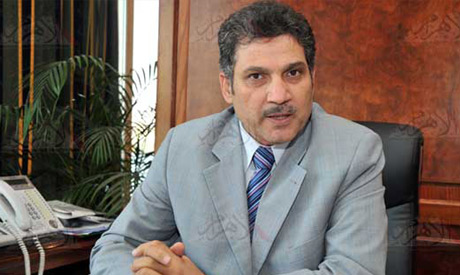
Mega Damming of the Life giving waters of Ethiopia. This process is menacing the existence of the inhabitants of the region by drying the sources and lakes. The main reason advertised for damming is for production of Electricity and exporting energy. This could be done by small human level dams.The underlying reason is to the irrigation for the great land grabbing for cash crop exportation for financial speculators. Moreover, such mega projects leads to undue water crisis.
Friday, November 20, 2015
Monday, November 9, 2015
Ethiopia says Consultants fail to reach joint vision on GERD | TVC NEWS

TVC NEWS [ADDIS ABABA] - Ethiopia’s minister of water and energy Motuma Mekasa on Saturday said the French and Dutch consultants have failed to come up with a common guideline to implement the technical studies for the Grand Ethiopian Renaissance Dam (GERD).
Mekasa, who addressed the opening session of the tripartite national technical committee on GERD in Cairo Saturday, said “we will discuss several options during this meeting”.
The Ethiopian minister further underlined that his government has already embarked on preparing the required technical studies indicating they are not the party responsible for the delay in the preparation of those studies.
The multi-billion dollar dam is being constructed on the Blue Nile, about 20 kilometers from the Sudanese border, and has a capacity of 74 billion cubic meters, and is expected to generate electrical power of up to 6,000 megawatts.
Egypt fears the dam will negatively affect its traditional share of water from the Nile, its only source of water which has been determined by a colonial-era water-sharing treaty.
But Ethiopia insists that this will not occur and asserts that the project is indispensable to its own national development and the economic welfare of its burgeoning population.
The Ethiopian minister provided three other options including to continue working with the French and Dutch consultants after overcoming their differences, to select one consultancy firm to undertake the required technical studies or to choose two other firms from those which were shorted-listed previously.
The three countries had previously formed a committee to select a consultancy firm to assess the impact of GERD on Sudan and Egypt. Four consultancy firms from France, Australia and Netherlands had been short-listed initially and invited to submit their proposals.
Mekasa pointed to the negative impact of poverty on people due to absence of food security and energy, saying “we need equitable use for our available resources in order to meet food and energy needs, eradicate poverty and raise the standard of living”.
He said that the real motive behind building the GERD is to combat poverty and achieve sustainable development by generating clean energy, expressing his government’s commitment to implement the framework agreement signed by the leaders of the three countries.
Mekasa also underscored his country’s readiness to exchange information with the members of the tripartite committee and implement the recommendations and outcome of the technical studies pertaining to the GERD.
Last March, the leaders of Sudan, Ethiopia and Egypt signed in Khartoum a framework cooperation deal on the GERD. The leaders said the “declaration of principles” would pave the way for further diplomatic cooperation on the GERD which has stirred fears of a regional resource conflict.
Sunday, November 8, 2015
Construction of Ethiopian Renaissance dam moving faster than dam talks: Egyptian irrigation minister - Politics - Egypt - Ahram Online
Construction of Ethiopian Renaissance dam moving faster than dam talks: Egyptian irrigation minister - Politics - Egypt - Ahram Online: "Construction of Ethiopian Renaissance dam moving faster than dam talks: Egyptian irrigation ministerNinth tripartite meeting between Egyptian, Ethiopian and Sudanese officials is taking place in Cairo
Ahram Online , Saturday 7 Nov 2015
Print Send
Views:1163
File photo: A general view shows construction activity on the Grand Renaissance dam in Guba Woreda, Benishangul Gumuz region March 16, 2014. Egypt fears the $4.7 billion dam, that the Horn of Africa nation is building on the Nile, will reduce a water supply vital for its 84 million people, who mostly live in the Nile valley and delta. Picture taken March 16, 2014 (Photo: Reuters
Related
Egypt concerned about Ethiopia Renaissance Dam, seeks 'meaningful dialogue'
Egypt has ‘pressure cards’ in Ethiopia Renaissance dam dispute, says minister
Egypt's irrigation minister visits Sudan to talk Ethiopian dam consensus
Ethiopia stalls negotiations with Egypt and Sudan over Renaissance Dam
The construction of the Grand Ethiopian Renaissance Dam is going ahead at a faster pace than the talks on the dam between Egypt, Ethiopia and Sudan, Egyptian Minister of Irrigation Hossam Moghazi said on Saturday.
"There is an extreme delay in achieving the road map we agreed upon in August 2014, compared to the construction rates of the Grand Renaissance Dam," said Moghazi at the opening session of the ninth tripartite meeting in Cairo.
The irrigation ministers and the tripartite national committee set up to look at the dam are meeting to continue attempts to resolve the conflicts between the foreign consultancy firms conducting studies related to the dam.
In September, Dutch consultancy firm Deltares withdrew from the assessment of the dam, saying that the conditions imposed by the tripartite national committee -- which includes representatives from Egypt, Sudan and Ethiopia, as well as the French consultancy firm BRL -- did not provide sufficient guarantees to Deltares that an independent high-quality study could be carried out.
The future of negotiations has remained unclear after several postponed meetings in October.
According to the irrigation ministry, Egypt is suffering from a water deficit of 20 billion cubic metres, which it compensates for through water recycling, an inadvisable process in the long term.
The Grand Ethiopian Renaissance Dam, now under construction on the Blue Nile River in Ethiopia and scheduled to be completed i"
'via Blog this'
Ahram Online , Saturday 7 Nov 2015
Print Send
Views:1163
File photo: A general view shows construction activity on the Grand Renaissance dam in Guba Woreda, Benishangul Gumuz region March 16, 2014. Egypt fears the $4.7 billion dam, that the Horn of Africa nation is building on the Nile, will reduce a water supply vital for its 84 million people, who mostly live in the Nile valley and delta. Picture taken March 16, 2014 (Photo: Reuters
Related
Egypt concerned about Ethiopia Renaissance Dam, seeks 'meaningful dialogue'
Egypt has ‘pressure cards’ in Ethiopia Renaissance dam dispute, says minister
Egypt's irrigation minister visits Sudan to talk Ethiopian dam consensus
Ethiopia stalls negotiations with Egypt and Sudan over Renaissance Dam
The construction of the Grand Ethiopian Renaissance Dam is going ahead at a faster pace than the talks on the dam between Egypt, Ethiopia and Sudan, Egyptian Minister of Irrigation Hossam Moghazi said on Saturday.
"There is an extreme delay in achieving the road map we agreed upon in August 2014, compared to the construction rates of the Grand Renaissance Dam," said Moghazi at the opening session of the ninth tripartite meeting in Cairo.
The irrigation ministers and the tripartite national committee set up to look at the dam are meeting to continue attempts to resolve the conflicts between the foreign consultancy firms conducting studies related to the dam.
In September, Dutch consultancy firm Deltares withdrew from the assessment of the dam, saying that the conditions imposed by the tripartite national committee -- which includes representatives from Egypt, Sudan and Ethiopia, as well as the French consultancy firm BRL -- did not provide sufficient guarantees to Deltares that an independent high-quality study could be carried out.
The future of negotiations has remained unclear after several postponed meetings in October.
According to the irrigation ministry, Egypt is suffering from a water deficit of 20 billion cubic metres, which it compensates for through water recycling, an inadvisable process in the long term.
The Grand Ethiopian Renaissance Dam, now under construction on the Blue Nile River in Ethiopia and scheduled to be completed i"
'via Blog this'
Tuesday, November 3, 2015
Egypt concerned about Renaissance Dam, seeks 'meaningful dialogue' - Politics - Egypt - Ahram Online
takes of the past,’ making the relationship with Nile basin countries a priority for foreign policy
Ahram Online , Monday 2 Nov 2015

Egypt's irrigation minister Hossam Moghazi (Al-Ahram)
Related
Moghazi said in a press conference on the sidelines of his inspection visit to a group of water projects in Sharqiya governorate that Egypt is exerting effort in order to eliminate such worries on an objective and scientific basis and through 'meaningful dialogue' with other Nile basin countries.
Moghazi said that Saturday's ninth dam meeting, to be convened in Cairo, would be held to resolve the conflicts between the foreign consultancy firms conducting studies related to the Ethiopian dam.
He said that several pivotal alternatives would be raised in order to resolve the conflict. Only experts from Egypt, Ethiopia, and Sudan will attend Saturday's meeting in Cairo.
According to Moghazi, a report will then be delivered to the three countries' irrigation ministers.
A meeting will then take place between the three countries’ irrigation ministers, as well as possibly the foreign ministers, in order to reach an agreement.
Moghazi also affirmed that Egypt's share of Nile water is non-negotiable, adding that it will work on increasing the country’s share of Nile water.
According to Moghazi, there has been a noticeable development in the relationship between Egypt and Nile Basin countries.
He added that Egypt is “rectifying the mistakes of the past,” making the relationship with Nile basin countries a priority for foreign policy.
In September, Dutch consultancy firm Deltares withdrew from the assessment of the dam.
Deltares stated that it had withdrawn from the project because the conditions imposed by the Tripartite National Committee (TNC) -- which includes representatives from Egypt, Sudan and Ethiopia, as well as the French consultancy firm BRL -- did not provide sufficient guarantees to Deltares that an independent high-quality study could be carried out.
Since then, the future of the Renaissance Dam negotiations has remained unclear after several postponed meetings in October.
According to the irrigation ministry, Egypt is suffering from a water deficit of 20 billion cubic metres, which it compensates through water recycling, an inadvisable process in the long term.
The Grand Ethiopian Renaissance Dam, now under construction across the Blue Nile River in Ethiopia and scheduled to be completed in 2017, will be Africa's largest hydroelectric power plant with a storage capacity of 74 billion cubic meters of water.
Subscribe to:
Posts (Atom)